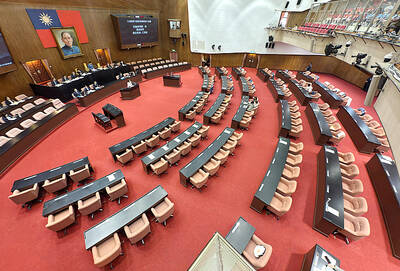Amendments to close loopholes in the Lobbying Act (遊說法) are required to bolster laws against foreign-funded lobbying, the Democratic Progressive Party (DPP) said yesterday, following reports that a Chinese electric vehicle firm allegedly made a bid to influence lawmakers.
The Chinese-language Mirror Media (鏡週刊) magazine on Tuesday reported that BYD Co (比亞迪) was partnering with Taikoo Motors Ltd (太古汽車) to use Taikoo’s Taipei-based dealership to import vehicles assembled in Thailand.
A BYD representative recently hosted a banquet for aides to the Legislative Yuan’s speaker and deputy speaker, the report said.

Photo: Reuters
Taiwan bans direct imports of fully assembled vehicles from China. Locally assembled vehicles using Chinese components must meet strict localization thresholds to be approved for sale and registration.
Article 8 of the act stipulates that “people, legal persons, organizations or other institutions from Mainland China shall not lobby in person or commission other lobbyists to do so; the same stipulation also applies to residents, legal persons, organizations or other institutions from Hong Kong or Macau.”
DPP Legislator Wang Ting-yu (王定宇) yesterday said that the article’s prohibitions against lobbying by Chinese are “a joke,” as no penalties were authorized for contraventions of the statute.
Wang said he would propose amendments to the act to punish Chinese entities or their proxies for unethical lobbying targeting government officials with a fine of NT$1 million to NT$5 million (US$33,344 to US$166,722).
A previous attempt to make a similar change had stalled due to a crowded legislative agenda, he said.
The absence of penalties for unethical lobbying by Chinese nationals or their proxies is an obvious loophole that must be addressed, DPP Legislator Chiu Chih-wei (邱志偉) said.
Levying fines on Chinese nationals, entities or proxies acting on their behalf would require amendments to the National Security Act (國家安全法), the Anti-Infiltration Act (反滲透法) and the Act Governing Relations Between the People of the Taiwan Area and the Mainland Area (臺灣地區與大陸地區人民關係條例), Chiu said.
Unethical lobbying on behalf of China endangers Taiwan’s sovereignty and security, he said.
He also called on Legislative Speaker Han Kuo-yu (韓國瑜) to refrain from “setting a bad example.”
The speaker has an obligation to abide by basic rules governing ethical conduct lest he bring shame to the Legislative Yuan and the nation, Chiu said.
Taiwan People’s Party (TPP) Legislator Lin Kuo-cheng (林國成) said that accusations of wrongdoing based on Mirror Media’s report would be a stretch, as the law does not provide a sufficiently precise definition of “lobbying.”
TPP caucus whip Han Kuo-chan (黃國昌) said that his caucus would call for an investigative committee be convened over BYD’s alleged attempt to influence lawmakers.
The TPP expects the DPP to fully cooperate with the planned probe and behave impartially during its proceedings, he said, adding that he “abhors” importers who try to obscure the origin of their products.
Additional reporting by CNA

CROSS-STRAIT COLLABORATION: The new KMT chairwoman expressed interest in meeting the Chinese president from the start, but she’ll have to pay to get in Beijing allegedly agreed to let Chinese Nationalist Party (KMT) Chairwoman Cheng Li-wun (鄭麗文) meet with Chinese President Xi Jinping (習近平) around the Lunar New Year holiday next year on three conditions, including that the KMT block Taiwan’s arms purchases, a source said yesterday. Cheng has expressed interest in meeting Xi since she won the KMT’s chairmanship election in October. A source, speaking on condition of anonymity, said a consensus on a meeting was allegedly reached after two KMT vice chairmen visited China’s Taiwan Affairs Office Director Song Tao (宋濤) in China last month. Beijing allegedly gave the KMT three conditions it had to

‘BALANCE OF POWER’: Hegseth said that the US did not want to ‘strangle’ China, but to ensure that none of Washington’s allies would be vulnerable to military aggression Washington has no intention of changing the “status quo” in the Taiwan Strait, US Secretary of Defense Pete Hegseth said on Saturday, adding that one of the US military’s main priorities is to deter China “through strength, not through confrontation.” Speaking at the annual Reagan National Defense Forum in Simi Valley, California, Hegseth outlined the US Department of Defense’s priorities under US President Donald Trump. “First, defending the US homeland and our hemisphere. Second, deterring China through strength, not confrontation. Third, increased burden sharing for us, allies and partners. And fourth, supercharging the US defense industrial base,” he said. US-China relations under

The Chien Feng IV (勁蜂, Mighty Hornet) loitering munition is on track to enter flight tests next month in connection with potential adoption by Taiwanese and US armed forces, a government source said yesterday. The kamikaze drone, which boasts a range of 1,000km, debuted at the Taipei Aerospace and Defense Technology Exhibition in September, the official said on condition of anonymity. The Chungshan Institute of Science and Technology and US-based Kratos Defense jointly developed the platform by leveraging the engine and airframe of the latter’s MQM-178 Firejet target drone, they said. The uncrewed aerial vehicle is designed to utilize an artificial intelligence computer

The Chinese Nationalist Party (KMT) caucus yesterday decided to shelve proposed legislation that would give elected officials full control over their stipends, saying it would wait for a consensus to be reached before acting. KMT Legislator Chen Yu-jen (陳玉珍) last week proposed amendments to the Organic Act of the Legislative Yuan (立法院組織法) and the Regulations on Allowances for Elected Representatives and Subsidies for Village Chiefs (地方民意代表費用支給及村里長事務補助費補助條例), which would give legislators and councilors the freedom to use their allowances without providing invoices for reimbursement. The proposal immediately drew criticism, amid reports that several legislators face possible charges of embezzling fees intended to pay